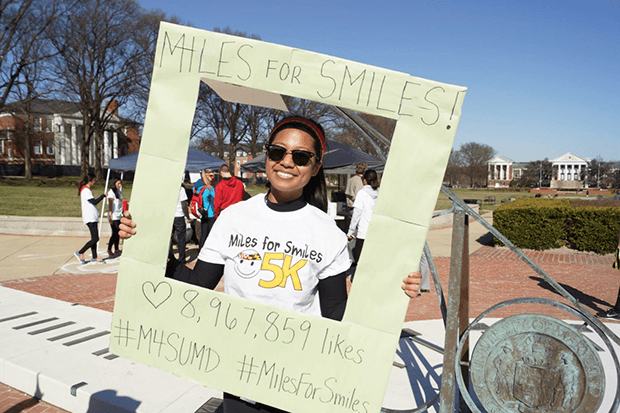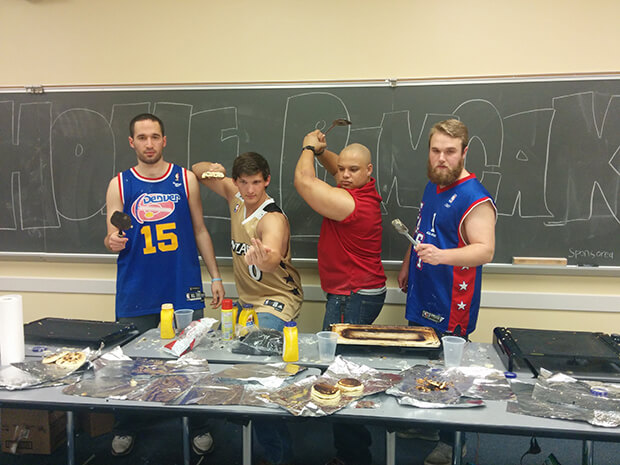- April 21, 2015
- By Lauren Brown
Here’s a problem budding nonprofits don’t typically face: lowballing their fundraising goals.
Linda Powers ’15 and her “Miles for Smiles 5K” team in the university’s “Do Good Now” course had been hustling to recruit sponsors and runners for the 5K they’d organized. Their goal was to raise money for basic dental supplies for children in Honduras.
Reading the literature on philanthropy, honing the group’s formal presentations on the cause and sticking to the class deadlines, Powers blew right past her initial $1,000 target. Her team kept bumping it up “because we didn’t want people to think we reached our goal!”
The event last month ended up drawing 150 runners and raising more than $3,500. “It was one of the most rewarding, most wonderful days of my life,” says Powers, an aspiring dentist majoring in cell biology and molecular genetics.
Her team is one of 26 from the four sections of the course expected to compete in the university’s fourth annual Do Good Challenge on April 28, founded by the School of Public Policy’s (SPP) Center for Philanthropy and Nonprofit Leadership, and in partnership with the Robert H. Smith School of Business’ Center for Social Value Creation. It is sponsored by Morgan Stanley Private Wealth Management.
The philanthropy center’s director, Professor Robert Grimm, came up with the idea for a course to prepare students for the contest, which awards Terps who make the greatest social impact for their favorite cause in eight weeks.
ABOUT 60 TEAMS WILL FACE OFF to win $20,000 in prizes at the Do Good Challenge. The top six will pitch to the crowd and three high-profile judges at the Finals at 7 p.m. April 28 in the Samuel Riggs IV Alumni Center.
He says student social entrepreneurs face unique challenges in balancing their academics and personal lives with new social ventures and need more training to successfully launch them.
“Combining classes and other kinds of coaching and mentoring is one of the smartest strategies to incubate these incredible philanthropic ideas and efforts that students are passionate about and achieve the biggest impact they can to achieve their mission,” Grimm says.
With sections for students in Honors, the College of Behavioral and Social Sciences, SPP and its new iGive living and learning program, the course opens a bit like a speed dating session. Undergraduates who have an idea share it with the full group of 100 students in hopes of attracting those who already share that passion or want to find out more. They mingle and match up into teams of five or six, and begin learning about how to design a project, lead a team, mobilize volunteers and raise money.
Besides having the opportunity to compete in the Do Good Challenge, the teams will also face off for a $1,000 class prize in May. The intent of both presentations is the same: to show how they used their talents, were creative and made an impact.
William Dorland, executive director of the Honors College, is one of the four instructors; he helped start the Chordoma Foundation and continues to raise money to fight that form of cancer. The effort is personal, since he’s a chordoma patient himself.
“In class, we want them to learn how to plan, execute responsibly and think critically about their successes and failures,” he says. “If their project raises no money and saves no lives, but they can understand where things went wrong, they can still earn a good grade.”
The course is a companion to one offered each semester that has students learn about philanthropy by determining how to give away $10,000 of real money to a worthy cause. That’s where Nathan Peterson, a junior majoring in elementary education, pitched his venture “Bring Leo Home” to students.
His family in Montgomery County adopted a boy, Vitaly, now 16, from a Latvian orphanage, and Peterson has spent the past three summers volunteering there. The costliness of his family’s adoption of another brother, Leo, from China, inspired him to start his project to raise money and promote awareness for orphans’ care and adoption.
The organization, now seeking official nonprofit status and raising money for another family adopting from Latvia, has 15 members—plus the six now taking the “Do Good Now” course.
Their first fundraising idea? Put President Wallace Loh in a dunk tank.
Peterson pointed out that wasn’t so practical. Instead, they held a one-day bake-sale delivery service earlier this month, sold hot chocolate in March and supported the charity’s other fundraisers, including a pancake breakfast and a water balloon blast.
“They’ve become more realistic,” Peterson says. “And some of the questions they ask—they get the process that we’ve been using and are familiar with.”
 He hopes the new students continue to be part of the organization after the semester ends. Powers, who will attend the University of Maryland School of Dentistry in the fall, plans to hold a second annual Miles for Smiles 5K on campus next spring. She’s been passionate about dental care since her father had oral cancer when she was in elementary school.
He hopes the new students continue to be part of the organization after the semester ends. Powers, who will attend the University of Maryland School of Dentistry in the fall, plans to hold a second annual Miles for Smiles 5K on campus next spring. She’s been passionate about dental care since her father had oral cancer when she was in elementary school.
She’s traveled to rural Central America three times with the Global Dental Brigade’s UMD chapter, and with the money her new group has raised, she looks forward to buying the chapter cases of toothbrushes, toothpaste, floss and mouthwash to distribute on the brigade’s next trip.
“It’s the last semester of my senior year, and I’ve finished all my graduation requirements,” she says. “I figured this was a perfect way to leave my final mark on Maryland.”
Tags
Student Experience